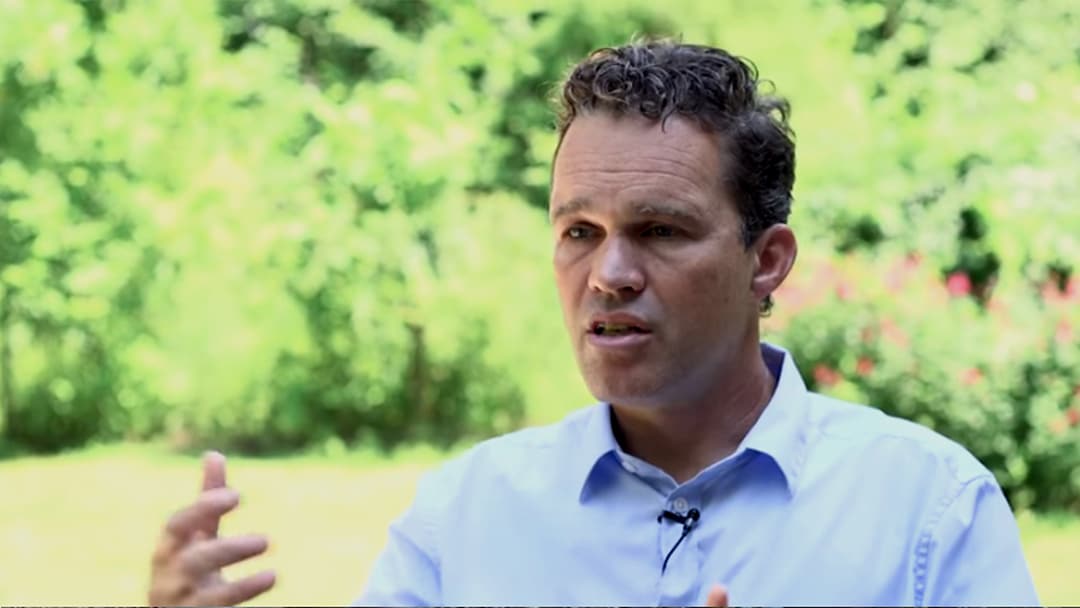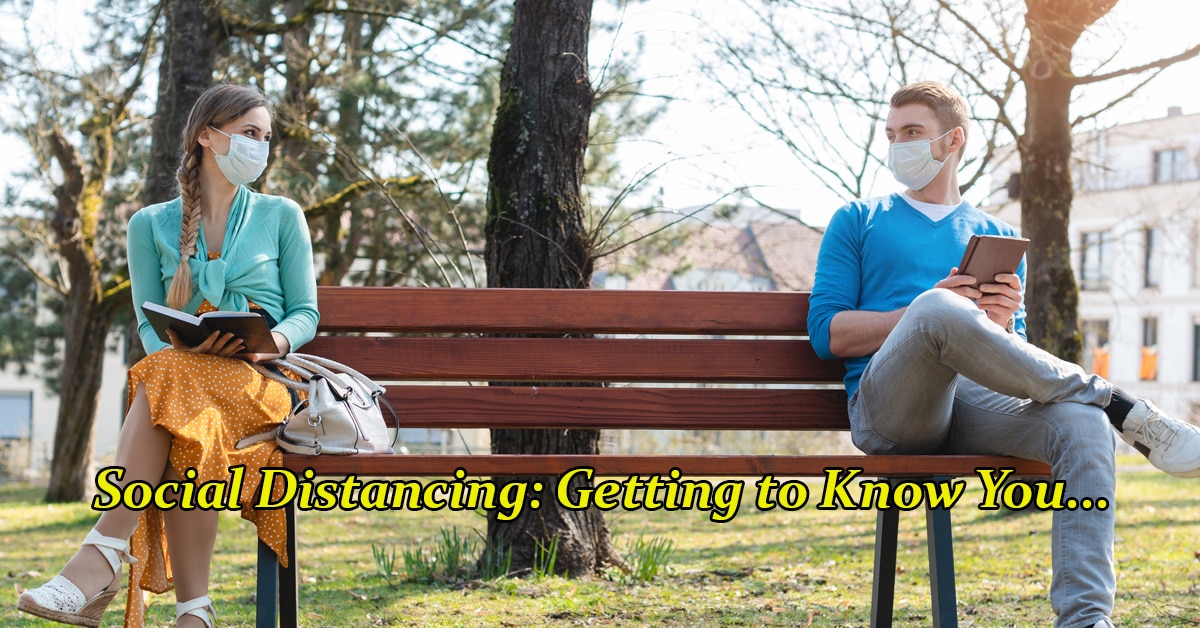
Social Distancing – Why They want You Isolated and Alone
by Academy of Ideas | Jul 19, 2024
…totalitarian domination as a form of government is new in that it… bases itself on loneliness, on the experience of not belonging to the world at all, which is among the most radical and desperate experiences of man.
Hannah Arendt, The Origins of Totalitarianism
Many people have amnesia regarding that fact that a mere few years ago we were forced to seclude ourselves in our homes, banned from partaking in social activities and attending communal gatherings, and even told to maintain our distance from others out in public or in our own homes. What was the intention of this extreme social isolation? Was it to protect us, or is there a more nefarious reason behind the social distancing and isolation we were forced to endure? In this video, we explain how tyrants and totalitarians in the 20th century, and into the modern day, have attempted to isolate and atomize individuals, in order to make them easier to control.
In his book Community and Power, Robert Nisbet writes:
“The genius of totalitarian leadership lies in its profound awareness that human personality cannot tolerate moral isolation. It lies, further, in its knowledge that absolute and relentless power will be acceptable only when it comes to seem the only available form of community and membership.”
Robert Nisbet, Community and Power
Man has social needs that must be fulfilled as a basis for psychological health. Throughout most of history, these needs have been satisfied at a tribal or local level. For hundreds of thousands of years our hunter-gatherer ancestors lived in small, tight-knit tribes, and each member’s sense of self was deeply intertwined with the group. This tribal identity provided our ancestors with an unwavering sense of social belonging.
“History teaches that in the beginning the individual did not exist as an independent entity…In the early state there is a fusion of the individual with the group.”
Erich Neumann, The Origins and History of Consciousness.
In medieval society man started to emerge as an independent individual, yet his social needs were still satisfied through the diverse community associations that flourished in towns and villages, such as markets, guilds, local assemblies, town councils, communes, churches, fraternities, charities, monasteries, universities, and the primal community of the family. This multitude of community associations provided medieval man with a strong sense of social belonging that not only bolstered his psychological health, but also his courage and will to resist external powers which posed a threat to his social groups.
“Only in their social interdependences are men given to resist the tyranny that always threatens to arise out of any political government, democratic or other.”
Robert Nisbet, Community and Power
Another benefit of the diverse array of community associations that existed in the Middle Ages is that each had authority figures who, as a result of a superior character, knowledge, and ability, served as role models, maintained communal order, and mediated disagreements among members. This proliferation of authority figures created a web of decentralized authority that safeguarded societies from being overtaken by any single centralized power. Or as Nisbett continues:
“We are prone to see the advance of power in the modern world as a consequence…of that diminution of individual freedom. But a more useful way would be to see it in terms of the retreat of authority in many of the areas of society within which human beings commonly find roots and a sense of the larger whole…. It is power, not authority, that seeks homogeneity, regimentation, and the manipulated articulation of parts by hierarchies of administrators. And it is the competition of authorities within society at large that, above most things I can think of, keeps a society mobile and free. “Multiply your associations and be free,” wrote the great Proudhon.”
Robert Nisbet, Community and Power
The modern state came into existence in the 17th century and one of the primary trends that accompanied its development was the destruction of traditional community associations. The state, defined by its bureaucratic form of organization and a stability that extends beyond any individual ruler, has from its inception imposed itself as the intermediary, regulator, or manager, of almost all forms of social organization and interaction. As a few examples, with the birth of the modern state, guilds that regulated trade and maintained quality standards were replaced by government regulatory bodies. Charitable and private hospitals and institutions for the sick and disabled were replaced by institutions of the Welfare State. Private schools and educational institutions were replaced by State run public schools. And the defense provided by merchant leagues was replaced by enormous state militaries. In absorbing or destroying the medieval forms of community, the modern State spread its tentacles throughout society and methodically built up what is now an all-encompassing political community. Or as Nisbet explains:
“The structure of political power which came into being three centuries ago on the basis of its eradication of medieval forms of community has remained—has indeed become ever more—destructive of the contents of new forms of community….Knowing the basic psychological truth that life apart from some sense of membership in a larger order is intolerable for most people, the leaders of the total State thus direct their energies not just to the destruction of the old order but to the manufacture of the new.”
Robert Nisbet, Community and Power
In the 19th and 20th centuries many intellectuals assisted the State’s efforts to dismantle traditional community associations by arguing that institutions such as the church and the family were outdated, obsolete, and oppressive. Friedrich Nietzsche attacked the community of Christian Church, calling it “the greatest of all imaginable corruptions”. Herbert Marcuse, a member of the Frankfurt School of Critical Theory, joined the growing voices of 20th century radical feminism by arguing that the community of the family was a patriarchal system of oppression. What motivated these modern iconoclasts was the idea that traditional communities and institutions limited man’s freedom to develop in an autonomous manner, or as Ross Douthat explains:
“As social institutions, these [community] associations would be attacked as inhumane, irrational, patriarchal, and tyrannical; as sources of clinical and economic power, they would be dismissed as outdated, fissiparous, and inefficient. In place of a web of overlapping communities and competing authorities, the liberal West set out to build a society of self-sufficient, liberated individuals…”
Ross Douthat, Introduction to Community and Power
What these intellectual iconoclasts did not foresee is that most people are not self-sufficient or mentally strong enough to embrace freedom when they lack community involvement and a sense of social belonging. The dismantling of traditional community associations has left many people lacking the social ties that give their life meaning and joy. Furthermore, this so called “liberation” from the communal bonds of the past left many individuals socially isolated, anxious, alienated and lacking in purpose. This social atomization was taken to an extreme in the first few years of the 2020s, when individuals, most of whom already lacked a strong sense of community, were forced to isolate to a degree never before experienced society-wide. History shows, that when social atomization and isolation reach unnatural levels, it tends to trigger the phenomenon of enantiodromia. The law of enantiodromia, formulated by the Presocratic philosopher Heraclitus, states that when an individual or society is too one-sided or excessive in some important manner, a counterreaction to the opposite extreme will sooner or later occur. In accordance with this law, extreme social atomization triggers a swing to its opposite, extreme collectivism. And as most traditional forms of community have been destroyed, in the modern day this extreme collectivism plays out in the political realm, as individuals try to fulfill their needs by becoming fervent supporters and participants of the political community of the State. Or as Ross Douthat writes:
“Man is a social being, and his desire for community will not be denied…And if he can’t find that community on a human scale, then he’ll look for it on an inhuman scale—in the total community of the totalizing state.”
Ross Douthat, Introduction to Community and Power
That modern man, in his social isolation, is seeking to satiate his yearning for community by forming a deep emotional and psychological bond with the political community of the State, is apparent when we look at the case histories of 20th century totalitarianism.
In her book The Origins of Totalitarianism, Hannah Arendt notes the intimate connection between social isolation, and the rise of 20th century totalitarianism. As she wrote:
“What prepares men for totalitarian domination in the non-totalitarian world is the fact that loneliness, once a borderline experience usually suffered in certain marginal social conditions like old age, has become an everyday experience of the ever-growing masses of our century.”
Hannah Arendt, The Origins of Totalitarianism
Hitler recognized that a lack of community creates a void of social isolation which can be filled by a strong leader and a strong state. Hence why, when in power, he suppressed and co-opted independent associations including trade unions, youth groups, and other cultural organizations, and replaced local town hall meetings with mass political meetings. In Mein Kampf Hitler wrote that:
“The mass meeting is necessary if only for the reason that in it the individual who in becoming an adherent of a new movement feels lonely and is easily seized with the fear of being alone, receives for the first time the picture of a great community, something that has a strengthening effect upon most people.”
Adolf Hitler, Mein Kampf
In a similar manner, the attraction which communism held to millions of people in the 20th century, and continues to hold for many today, has less to do with its ideology than with the sense of community it offers its adherents. Or as Nisbet explains:
“To a large number of human beings Marxism offers status, belonging, membership, and a coherent moral perspective. Of what matter and relevance are the empirical and logical refutations made by a host of critics as against the spiritual properties that Marx offers to millions.”
Robert Nisbet, Community and Power
If the cancerous growth of the modern state, as well as fascism, communism, and totalitarianism, are products of the socially atomized masses’ misguided search for community, then what Western societies desperately need is a revival of smaller scale community associations. Or as Nisbett writes in the Quest for Community:
“It is not the revival of old communities that the book in a sense pleads for; it is the establishment of new forms: forms which are relevant to contemporary life and thought…Hence the appeal…for what I call a new laissez faire, one within which groups, associations, and communities would prosper and which would be, by their very vitality, effective barriers to further spread of unitary, centralized, political power.”
Robert Nisbet, Community and Power
A diverse multitude of autonomous social groups and associations helps the individual maximize his potential by providing the communal support and security that is needed for an individual to face up to the challenges of life. Furthermore, it is usually only when man feels secure within a community, that he will risk the dangerous task of individuating himself and cultivating his idiosyncratic side. “…no conception of individuality is adequate that does not take into consideration the myriad ties which normally bind the individual to others from birth to death…”, explains Nisbett. Or as Carl Jung writes:
“Individuation is only possible with people, through people. You must realize that you are a link in a chain, that you are not an electron suspended somewhere in space or aimlessly drifting through the cosmos.”
Carl Jung, Zarathustra Seminar
If modern man continues to be socially isolated and alienated, and allows the State to separate and distance him others, then not only will individuation remain out of his reach, but many will continue to search for community in the totalizing State, and thus be complicit in their own enslavement. Regarding the man whose life is meaningless due to a lack of social connections, Carl Jung wrote that:
“…he is already on the road to State slavery and, without knowing or wanting it, has become its proselyte.”
Carl Jung, The Undiscovered Self
Or as Nisbett concludes:
“Totalitarianism is an ideology of nihilism. But nihilism is not enough. No powerful social movement can be explained in negative terms alone. There is always the positive goal…We should miss the essence of the total State if we did not see in it elements that are profoundly affirmative. The extraordinary accomplishments of totalitarianism in the twentieth century would be inexplicable were it not for the immense, burning appeal it exerts upon masses of individuals who have lost, or had taken away, their accustomed roots of membership and belief.”
Robert Nisbet, Community and Power





0 Comments